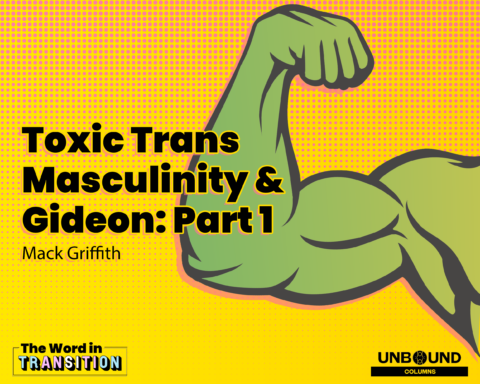Abstract
Peter’s confession of Jesus’ identity at Caesarea Philippi (Mark 8:27-33) models well- intentioned but misguided cisgender allyship to the transgender community. Jesus, who parallels a transgender person, endures misidentification and seeks affirmation from his disciples. Peter correctly validates Jesus’ identity, which models an ally’s support of a trans person’s name and pronouns. However, Peter’s rebuke of Jesus’ teaching about his impending suffering models misguided allyship, which pressures trans people to deny the struggles of being transgender in favor of a positive outlook on the future. Jesus’ refusal to celebrate Peter’s affirmation demonstrates that correct identification is a baseline expectation for interaction with all people, including transgender people and Jesus’s rebuke of Peter highlights the need for cisgender allies to listen to the often-painful realities transgender people know they will face rather than insist on positivity.
In Mark 8:27-33, on the way to Caesarea Philippi, Jesus asks his disciples, “Who do people say that I am?” The disciples offer several possibilities: John the Baptist, Elijah, or one of the other prophets. Having heard all of the incorrect ways by which he is identified, Jesus turns the question to his disciples directly and asks, “But who do you say that I am?” Peter answers, “You are the Messiah” (8:29). Jesus’ response to this correct answer is to order his disciples not to tell anyone about him (8:30). This conversation between Jesus and his disciples offers an example of allyship for cisgender people who seek to support their transgender loved ones in the face of misgendering and discrimination.
In this story, we see Jesus from his closest followers the validation of his identity that no one else understands. I imagine Jesus hearing all of the assumptions with growing disappointment and frustration because despite how complimentary each suggestion is, they remain incorrect. I also imagine Peter anxiously awaiting his chance to show Jesus that at least one person does recognize his identity. Peter must be dismayed when he gives the right answer and validates Jesus’ identity only to be ordered to keep it a secret.
Like Peter, many of my allies were confused when I first started coming out as transgender because, at first, I came out slowly to only close friends. They were often frustrated when others would misgender me because they wanted to support me and struggled to understand why I asked them not to correct people. Prior to coming out publicly, I remember the perplexing mixture of fear and hope that went into every interaction I had—wondering if the person I was interacting with would use the correct pronouns for me or realize that I was trans and refuse to use my correct name. While I hoped each person would identify me correctly, I was still worried about what would happen if they did. Would bystanders realize I was trans and say something transphobic or worse? Would the truth about my identity somehow get back to my family to whom I was not out?
For many transgender people, including myself, the coming out process is gradual. Many choose to disclose their identity only to their closest friends, and this secrecy can be frustrating to allies who desperately want their trans loved one to be properly recognized. Like Jesus, trans people might instruct their supporters not to correct others who misidentify them, because they are not ready for others to know or they believe it is not safe for them if others know. Allies like Peter who want to validate Jesus’s identity and prove that they do understand can find it hard to accept that the trans person may not be ready for the world to know—especially if, as in Peter’s case, there is no recognition or celebration for getting it right.
I have experienced days when constant misgendering and deadnaming weighs me down to the point where not even an ally’s validation provides relief.[1] While it can be difficult for an ally to accept that the trans person may not thank them for correctly identifying them, it can be even more difficult to challenge the notion that gratitude is necessary in response to acknowledging a trans person’s identity. I have heard cisgender people tell trans people their names and pronouns are too difficult to remember or that they have to be patient and endure constant misgendering until the person gets it correct, at which point immense gratitude is the only polite response. Cisgender people, however, do not congratulate others for identifying them by the correct name or pronouns and that is not the expectation—respect for a person’s identity is the baseline expectation of interacting with a person.
After ordering his disciples to keep his identity a secret, Jesus begins detailing the suffering and rejection he will receive at the hands of the elders, chief priests, and scribes, which will culminate in his death and resurrection (8:31). This teaching prompts Peter to take Jesus aside and rebuke him. Jesus angrily responds, “Get behind me, Satan! For you are setting your mind not on divine things but on human things” (8:33). I imagine Peter in absolute dismay, having taken Jesus aside to contradict his negativity outlook on the future only to be rebuked himself. Peter may think that it would be better if Jesus maintained an optimistic outlook and hoped that everyone would come to know his identity and love him for it. However, instead of commending Peter for his positive thinking or thanking him for trying to reframe the situation in a positive light, Jesus says that Peter has the wrong focus.
Optimism is hard to maintain for transgender people who live under the pain of the current oppression and under the threat of impending oppression. In the first four months of 2021 alone, 33 state legislatures have proposed over 100 anti-transgender bills that will primarily affect transgender children.[2] 2020 was the deadliest year on record for transgender people with at least 44 transgender people murdered in anti-trans violence and in 2021, there have already been at least 15 anti-transgender homicides.[3] At least 15 states have what the Transgender Law Center considers a “Negative Gender Identity Policy Tally,” meaning that the laws these states currently have on the books actively that harm transgender people.[4]
In 8:31, Jesus teaches his disciples about his impending suffering at the hands of the authorities. Jesus doesn’t deny the impending suffering or protect the disciples from the discomfort of hearing about the coming pain; according to 8:32, Jesus talks about his fate openly. Peter’s response is similar to what many people do when conversation turns to uncomfortable topics: ignore the negative and focus on the positive. While reframing is often a helpful way of coping with difficult circumstances, transgender people need to be allowed to acknowledge the suffering they will likely face. Some days I need someone to remind me of how much transgender acceptance has recently advanced, and other days that I need someone to listen as I complain about the condemnation from my childhood church, the rejection from my biological family, the pain of weekly testosterone shots, the fear of swimming without a shirt on, the scarcity of surgical options, and the overwhelmingly high rates of violence and discrimination. Trans people need allies who will listen and support them in both the positive moments and the moments of pain and suffering.
Like Peter, allies want to say the right thing and support their trans loved one in the best ways. But what is intended is not always the same thing as what is received. Sometimes allyship may not be met with celebration, and sometimes the best act of for an ally is to listen to the struggle and the pain. Like Jesus, we trans people need to know that someone sees us for who we are even if we are not ready for the world to know; sometimes, we need to talk about our suffering without being told “it gets better.” Jesus knows he will be resurrected just as the trans community hopes a safe and accepting world is coming, but that knowledge and hope do not erase the pain that comes first. Both experiences—of hope and of pain— are worth validating.
[1] The terms “deadname” and “birthname” refer the name a trans person is given at birth. Some prefer “birthname” as it has fewer negative connotations, whereas others prefer “deadname” because of the negative experiences associated with the name. Each trans person chooses how they refer to their birthname and as such, “birthname” should be used by cisgender people unless a trans person asks them to do otherwise.
[2] Priya Krishnakumar CNN, “This Record-Breaking Year for Anti-Transgender Legislation Would Affect Minors the Most,” CNN, 2021, https://www.cnn.com/2021/04/15/politics/anti-transgender-legislation-2021/index.html.
[3] “Fatal Violence Against the Transgender and Gender Non-Conforming Community in 2021,” Human Rights Campaign, 2021, https://www.hrc.org/resources/fatal-violence-against-the-transgender-and-gender-non-conforming-community-in-2021.
[4] “National Equality Map,” Transgender Law Center, 2021, https://transgenderlawcenter.org/equalitymap.

Mack Griffith (he/him/his) is transgender biblical scholar, poet, and 2021 Master of Theological Studies graduate of Vanderbilt Divinity School. After graduating from Vanderbilt Divinity School, he will go on to complete a Ph.D. in New Testament biblical studies through St. Mary’s University, Twickenham. Mack’s field of interest is transgender biblical studies, and he hopes to progress transgender biblical readings beyond defense of trans identities to readings that offer representation, hope, and empowerment to the transgender community.






Unbound Social